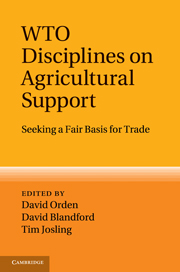Book contents
- Frontmatter
- Contents
- List of figures
- List of tables
- Notes on contributors
- Preface
- List of acronyms
- PART I overview of domestic support issues and WTO rules
- PART II Developed countries: have high levels of support come down?
- 3 European Union
- 4 United States
- 5 Japan
- 6 Norway
- PART III Developing countries: will low levels of support rise?
- PART IV Looking forward: can fair markets be achieved?
- Appendix A Domestic support provisions of the Agreement on Agriculture
- Appendix B Domestic support provisions of the Doha draft modalities
- Index
- References
4 - United States
Published online by Cambridge University Press: 11 April 2011
- Frontmatter
- Contents
- List of figures
- List of tables
- Notes on contributors
- Preface
- List of acronyms
- PART I overview of domestic support issues and WTO rules
- PART II Developed countries: have high levels of support come down?
- 3 European Union
- 4 United States
- 5 Japan
- 6 Norway
- PART III Developing countries: will low levels of support rise?
- PART IV Looking forward: can fair markets be achieved?
- Appendix A Domestic support provisions of the Agreement on Agriculture
- Appendix B Domestic support provisions of the Doha draft modalities
- Index
- References
Summary
Domestic support for agriculture by the United States has proven to be contentious in the World Trade Organization and a center of attention in the Doha negotiations. The United States signaled its willingness to accept tighter disciplines on domestic support but insisted on a harmonization of support levels, in effect reducing allowable domestic support in the EU by a greater amount. The US position has also been to require significantly increased market access in other countries, including the emerging markets. In addition to the tension over the level of US domestic support in the Doha Round, several challenges under the WTO dispute settlement process have raised questions about whether the United States is correctly notifying its support to the WTO. Even without a Doha Round outcome, US domestic farm programs will be the subject of international scrutiny.
The first part of this chapter provides a brief review of the political economy of US farm policies, including a synopsis of the Food, Conservation, and Energy (FCE) Act of 2008. The following section discusses US domestic support notifications from 1995–2008. We then assess compliance with the Agreement, including an examination of subsidies that arguably are misclassified, underreported, or omitted from the notifications. The following section provides projections of US support through 2016. These projections are compared to existing support commitments and those proposed in the December 2008 Doha draft modalities.
- Type
- Chapter
- Information
- WTO Disciplines on Agricultural SupportSeeking a Fair Basis for Trade, pp. 97 - 152Publisher: Cambridge University PressPrint publication year: 2011
References
- 4
- Cited by



